Corporations Law Case Study: Liquidator Actions Against Directors
VerifiedAdded on 2022/11/09
|5
|1060
|73
Case Study
AI Summary
This Corporations Law case study examines the responsibilities and potential liabilities of company directors, specifically Alice and Libby, under the Corporations Act 2001. It addresses the implications of insolvent trading, referencing Section 588G and potential defenses under Section 588H. The analysis considers a scenario where Libby, a director, is informed of the company's insolvency and explores whether her actions, including the use of company funds for personal expenses, constitute a breach of duty. The assignment discusses the powers of a liquidator, including the ability to recover debts from directors and the order of creditor payments. The conclusion highlights the liquidator's potential claims against Libby and the possibility of selling company assets to satisfy creditors. The case study relies on relevant legal precedents and statutory provisions to provide a comprehensive understanding of director's duties and the consequences of non-compliance.
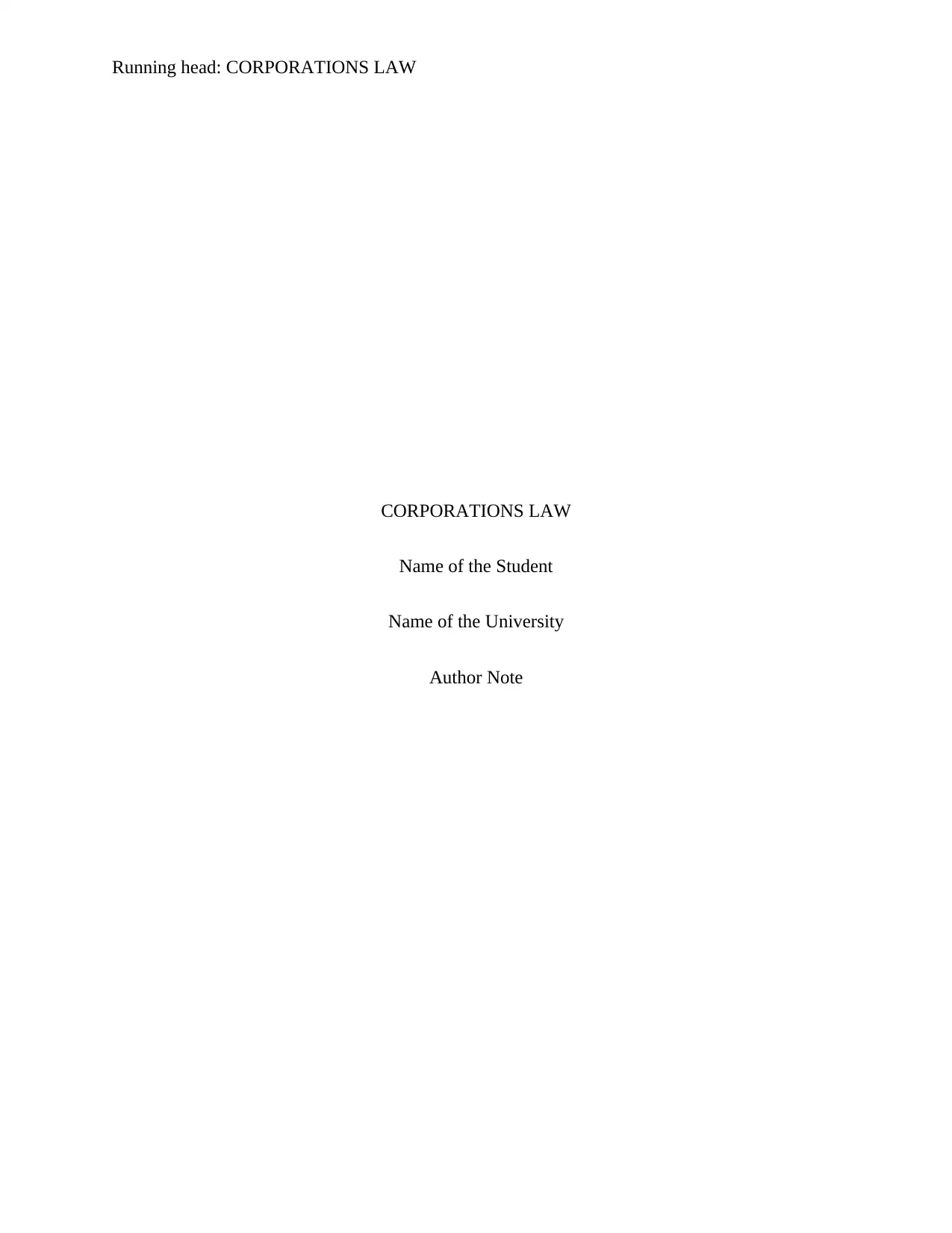
Running head: CORPORATIONS LAW
CORPORATIONS LAW
Name of the Student
Name of the University
Author Note
CORPORATIONS LAW
Name of the Student
Name of the University
Author Note
Paraphrase This Document
Need a fresh take? Get an instant paraphrase of this document with our AI Paraphraser
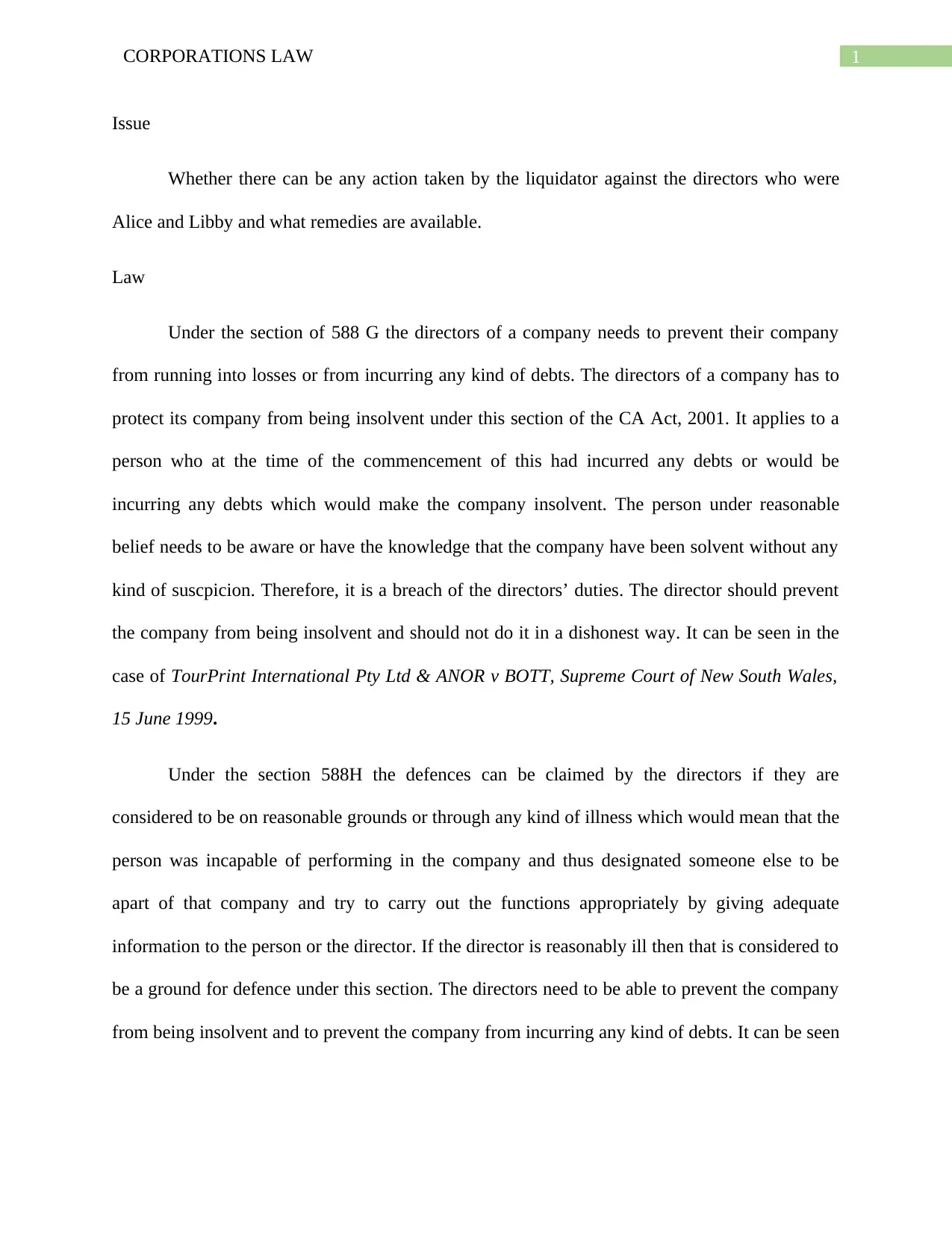
1CORPORATIONS LAW
Issue
Whether there can be any action taken by the liquidator against the directors who were
Alice and Libby and what remedies are available.
Law
Under the section of 588 G the directors of a company needs to prevent their company
from running into losses or from incurring any kind of debts. The directors of a company has to
protect its company from being insolvent under this section of the CA Act, 2001. It applies to a
person who at the time of the commencement of this had incurred any debts or would be
incurring any debts which would make the company insolvent. The person under reasonable
belief needs to be aware or have the knowledge that the company have been solvent without any
kind of suscpicion. Therefore, it is a breach of the directors’ duties. The director should prevent
the company from being insolvent and should not do it in a dishonest way. It can be seen in the
case of TourPrint International Pty Ltd & ANOR v BOTT, Supreme Court of New South Wales,
15 June 1999.
Under the section 588H the defences can be claimed by the directors if they are
considered to be on reasonable grounds or through any kind of illness which would mean that the
person was incapable of performing in the company and thus designated someone else to be
apart of that company and try to carry out the functions appropriately by giving adequate
information to the person or the director. If the director is reasonably ill then that is considered to
be a ground for defence under this section. The directors need to be able to prevent the company
from being insolvent and to prevent the company from incurring any kind of debts. It can be seen
Issue
Whether there can be any action taken by the liquidator against the directors who were
Alice and Libby and what remedies are available.
Law
Under the section of 588 G the directors of a company needs to prevent their company
from running into losses or from incurring any kind of debts. The directors of a company has to
protect its company from being insolvent under this section of the CA Act, 2001. It applies to a
person who at the time of the commencement of this had incurred any debts or would be
incurring any debts which would make the company insolvent. The person under reasonable
belief needs to be aware or have the knowledge that the company have been solvent without any
kind of suscpicion. Therefore, it is a breach of the directors’ duties. The director should prevent
the company from being insolvent and should not do it in a dishonest way. It can be seen in the
case of TourPrint International Pty Ltd & ANOR v BOTT, Supreme Court of New South Wales,
15 June 1999.
Under the section 588H the defences can be claimed by the directors if they are
considered to be on reasonable grounds or through any kind of illness which would mean that the
person was incapable of performing in the company and thus designated someone else to be
apart of that company and try to carry out the functions appropriately by giving adequate
information to the person or the director. If the director is reasonably ill then that is considered to
be a ground for defence under this section. The directors need to be able to prevent the company
from being insolvent and to prevent the company from incurring any kind of debts. It can be seen
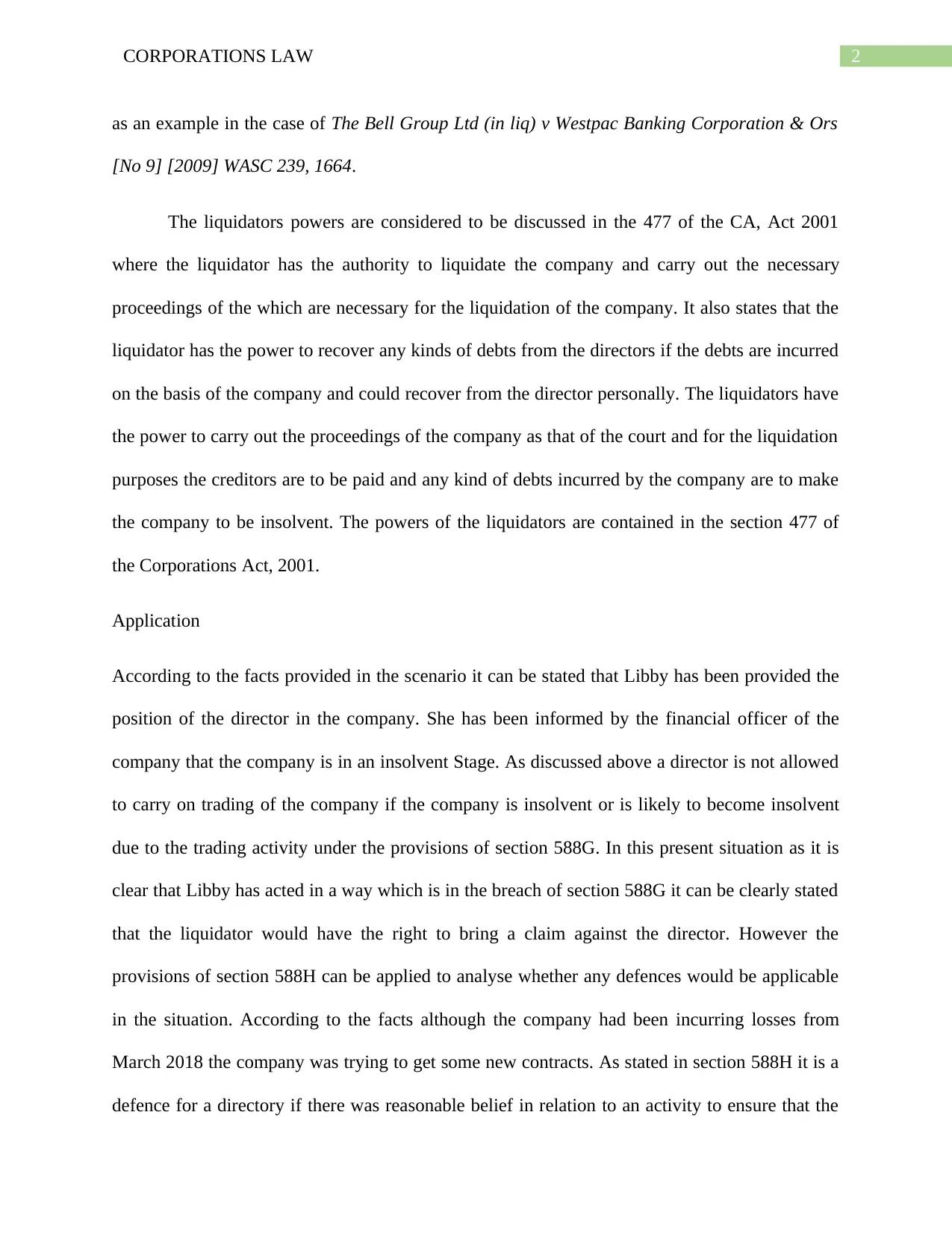
2CORPORATIONS LAW
as an example in the case of The Bell Group Ltd (in liq) v Westpac Banking Corporation & Ors
[No 9] [2009] WASC 239, 1664.
The liquidators powers are considered to be discussed in the 477 of the CA, Act 2001
where the liquidator has the authority to liquidate the company and carry out the necessary
proceedings of the which are necessary for the liquidation of the company. It also states that the
liquidator has the power to recover any kinds of debts from the directors if the debts are incurred
on the basis of the company and could recover from the director personally. The liquidators have
the power to carry out the proceedings of the company as that of the court and for the liquidation
purposes the creditors are to be paid and any kind of debts incurred by the company are to make
the company to be insolvent. The powers of the liquidators are contained in the section 477 of
the Corporations Act, 2001.
Application
According to the facts provided in the scenario it can be stated that Libby has been provided the
position of the director in the company. She has been informed by the financial officer of the
company that the company is in an insolvent Stage. As discussed above a director is not allowed
to carry on trading of the company if the company is insolvent or is likely to become insolvent
due to the trading activity under the provisions of section 588G. In this present situation as it is
clear that Libby has acted in a way which is in the breach of section 588G it can be clearly stated
that the liquidator would have the right to bring a claim against the director. However the
provisions of section 588H can be applied to analyse whether any defences would be applicable
in the situation. According to the facts although the company had been incurring losses from
March 2018 the company was trying to get some new contracts. As stated in section 588H it is a
defence for a directory if there was reasonable belief in relation to an activity to ensure that the
as an example in the case of The Bell Group Ltd (in liq) v Westpac Banking Corporation & Ors
[No 9] [2009] WASC 239, 1664.
The liquidators powers are considered to be discussed in the 477 of the CA, Act 2001
where the liquidator has the authority to liquidate the company and carry out the necessary
proceedings of the which are necessary for the liquidation of the company. It also states that the
liquidator has the power to recover any kinds of debts from the directors if the debts are incurred
on the basis of the company and could recover from the director personally. The liquidators have
the power to carry out the proceedings of the company as that of the court and for the liquidation
purposes the creditors are to be paid and any kind of debts incurred by the company are to make
the company to be insolvent. The powers of the liquidators are contained in the section 477 of
the Corporations Act, 2001.
Application
According to the facts provided in the scenario it can be stated that Libby has been provided the
position of the director in the company. She has been informed by the financial officer of the
company that the company is in an insolvent Stage. As discussed above a director is not allowed
to carry on trading of the company if the company is insolvent or is likely to become insolvent
due to the trading activity under the provisions of section 588G. In this present situation as it is
clear that Libby has acted in a way which is in the breach of section 588G it can be clearly stated
that the liquidator would have the right to bring a claim against the director. However the
provisions of section 588H can be applied to analyse whether any defences would be applicable
in the situation. According to the facts although the company had been incurring losses from
March 2018 the company was trying to get some new contracts. As stated in section 588H it is a
defence for a directory if there was reasonable belief in relation to an activity to ensure that the
⊘ This is a preview!⊘
Do you want full access?
Subscribe today to unlock all pages.

Trusted by 1+ million students worldwide
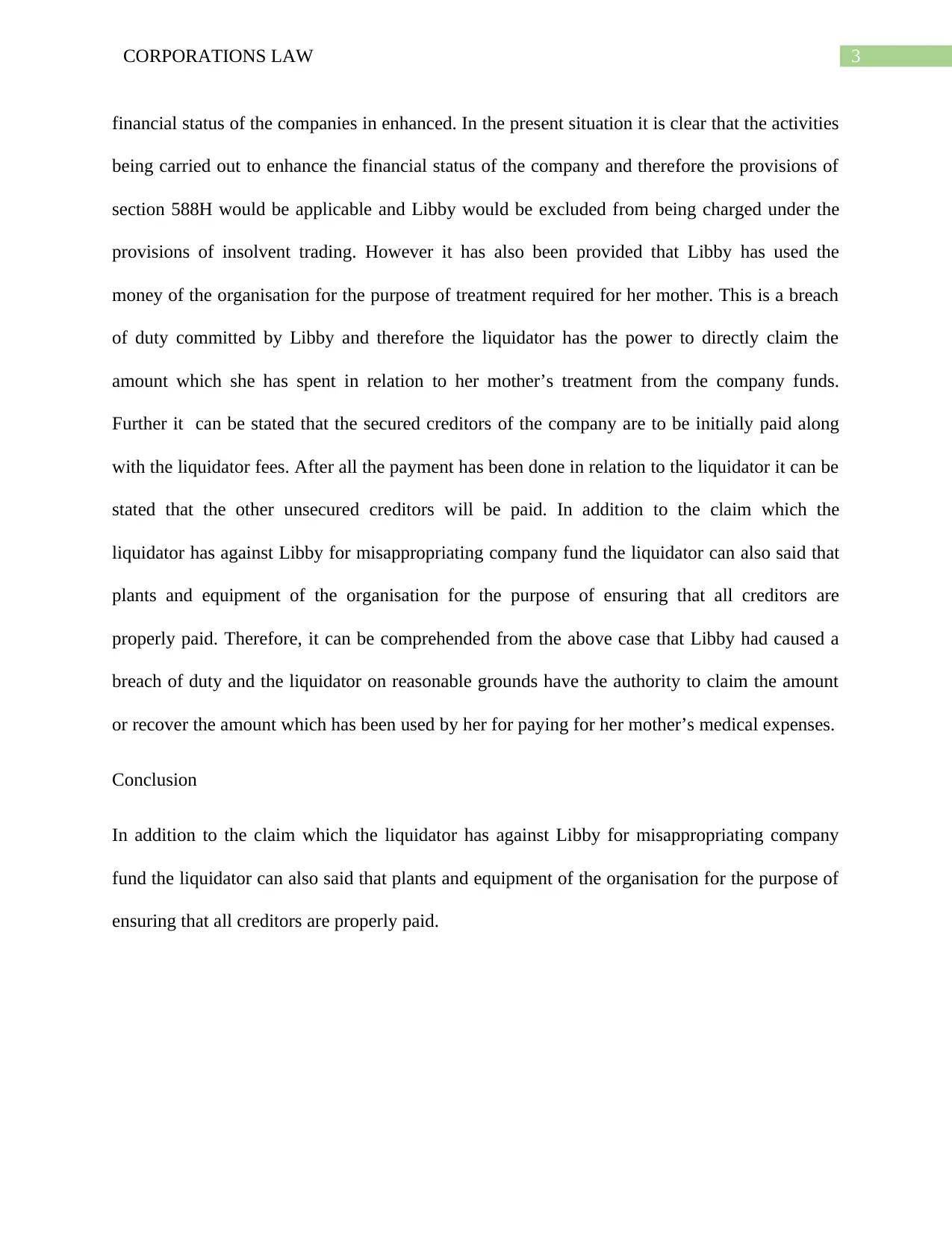
3CORPORATIONS LAW
financial status of the companies in enhanced. In the present situation it is clear that the activities
being carried out to enhance the financial status of the company and therefore the provisions of
section 588H would be applicable and Libby would be excluded from being charged under the
provisions of insolvent trading. However it has also been provided that Libby has used the
money of the organisation for the purpose of treatment required for her mother. This is a breach
of duty committed by Libby and therefore the liquidator has the power to directly claim the
amount which she has spent in relation to her mother’s treatment from the company funds.
Further it can be stated that the secured creditors of the company are to be initially paid along
with the liquidator fees. After all the payment has been done in relation to the liquidator it can be
stated that the other unsecured creditors will be paid. In addition to the claim which the
liquidator has against Libby for misappropriating company fund the liquidator can also said that
plants and equipment of the organisation for the purpose of ensuring that all creditors are
properly paid. Therefore, it can be comprehended from the above case that Libby had caused a
breach of duty and the liquidator on reasonable grounds have the authority to claim the amount
or recover the amount which has been used by her for paying for her mother’s medical expenses.
Conclusion
In addition to the claim which the liquidator has against Libby for misappropriating company
fund the liquidator can also said that plants and equipment of the organisation for the purpose of
ensuring that all creditors are properly paid.
financial status of the companies in enhanced. In the present situation it is clear that the activities
being carried out to enhance the financial status of the company and therefore the provisions of
section 588H would be applicable and Libby would be excluded from being charged under the
provisions of insolvent trading. However it has also been provided that Libby has used the
money of the organisation for the purpose of treatment required for her mother. This is a breach
of duty committed by Libby and therefore the liquidator has the power to directly claim the
amount which she has spent in relation to her mother’s treatment from the company funds.
Further it can be stated that the secured creditors of the company are to be initially paid along
with the liquidator fees. After all the payment has been done in relation to the liquidator it can be
stated that the other unsecured creditors will be paid. In addition to the claim which the
liquidator has against Libby for misappropriating company fund the liquidator can also said that
plants and equipment of the organisation for the purpose of ensuring that all creditors are
properly paid. Therefore, it can be comprehended from the above case that Libby had caused a
breach of duty and the liquidator on reasonable grounds have the authority to claim the amount
or recover the amount which has been used by her for paying for her mother’s medical expenses.
Conclusion
In addition to the claim which the liquidator has against Libby for misappropriating company
fund the liquidator can also said that plants and equipment of the organisation for the purpose of
ensuring that all creditors are properly paid.
Paraphrase This Document
Need a fresh take? Get an instant paraphrase of this document with our AI Paraphraser
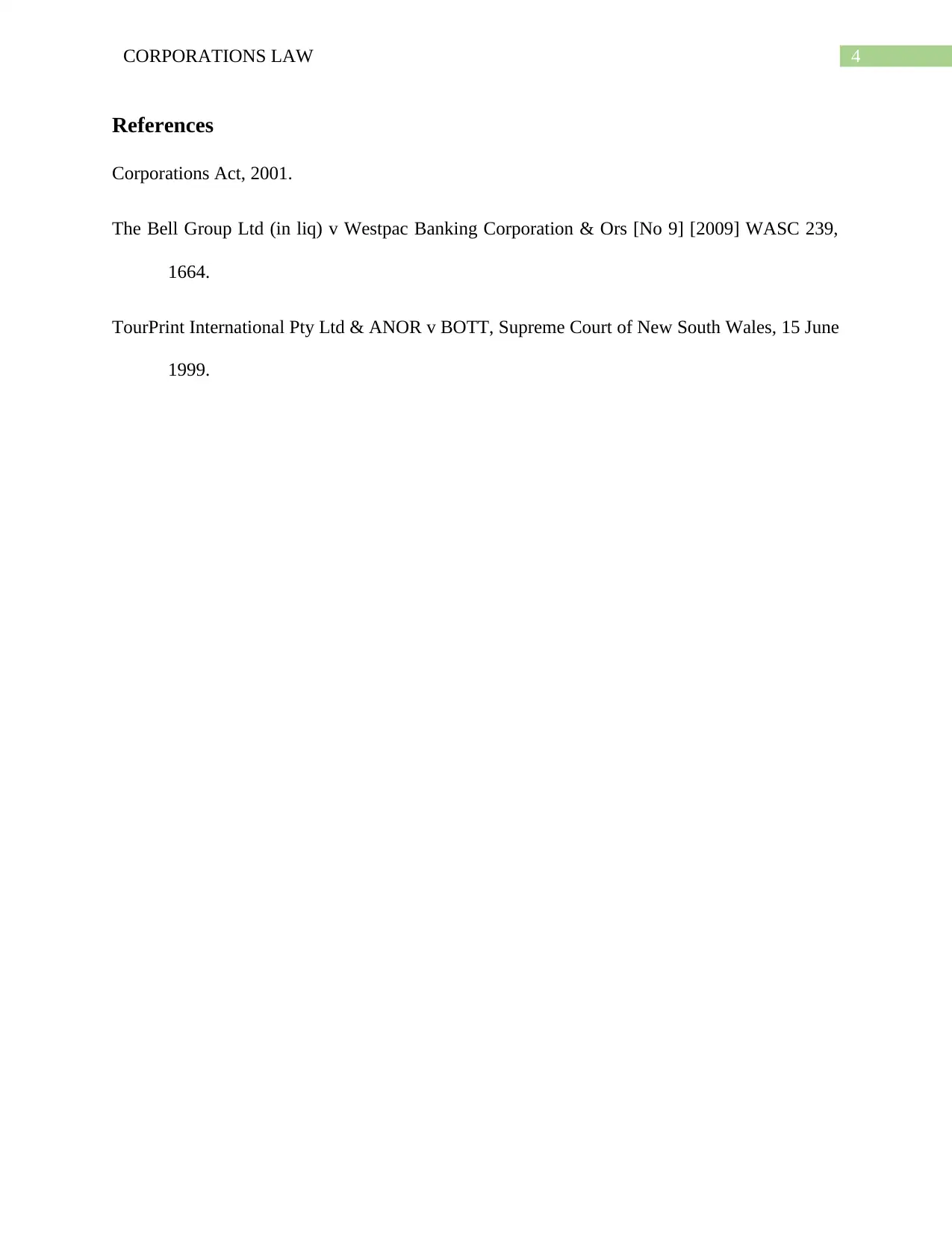
4CORPORATIONS LAW
References
Corporations Act, 2001.
The Bell Group Ltd (in liq) v Westpac Banking Corporation & Ors [No 9] [2009] WASC 239,
1664.
TourPrint International Pty Ltd & ANOR v BOTT, Supreme Court of New South Wales, 15 June
1999.
References
Corporations Act, 2001.
The Bell Group Ltd (in liq) v Westpac Banking Corporation & Ors [No 9] [2009] WASC 239,
1664.
TourPrint International Pty Ltd & ANOR v BOTT, Supreme Court of New South Wales, 15 June
1999.
1 out of 5
Related Documents
Your All-in-One AI-Powered Toolkit for Academic Success.
+13062052269
info@desklib.com
Available 24*7 on WhatsApp / Email
![[object Object]](/_next/static/media/star-bottom.7253800d.svg)
Unlock your academic potential
Copyright © 2020–2026 A2Z Services. All Rights Reserved. Developed and managed by ZUCOL.





